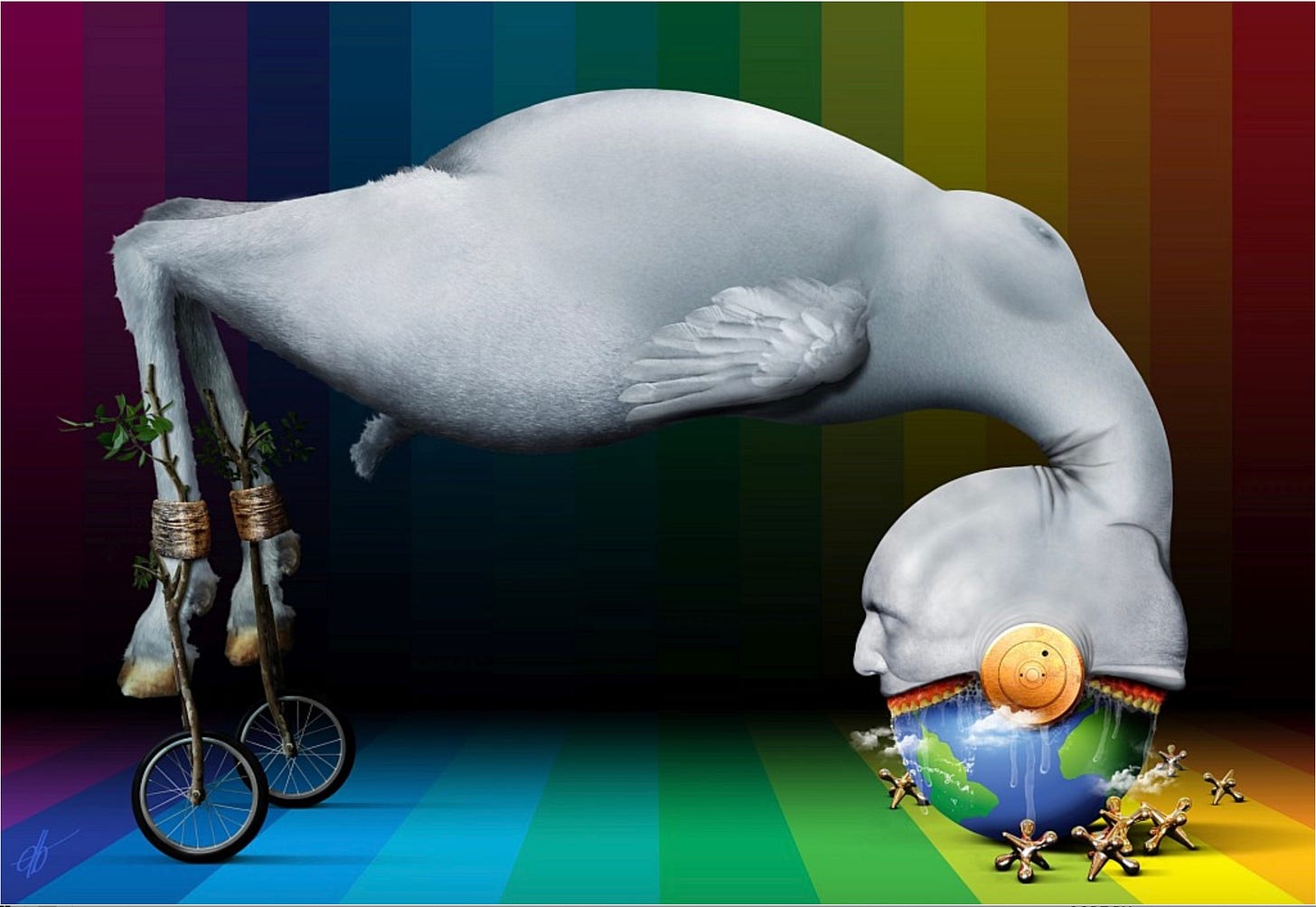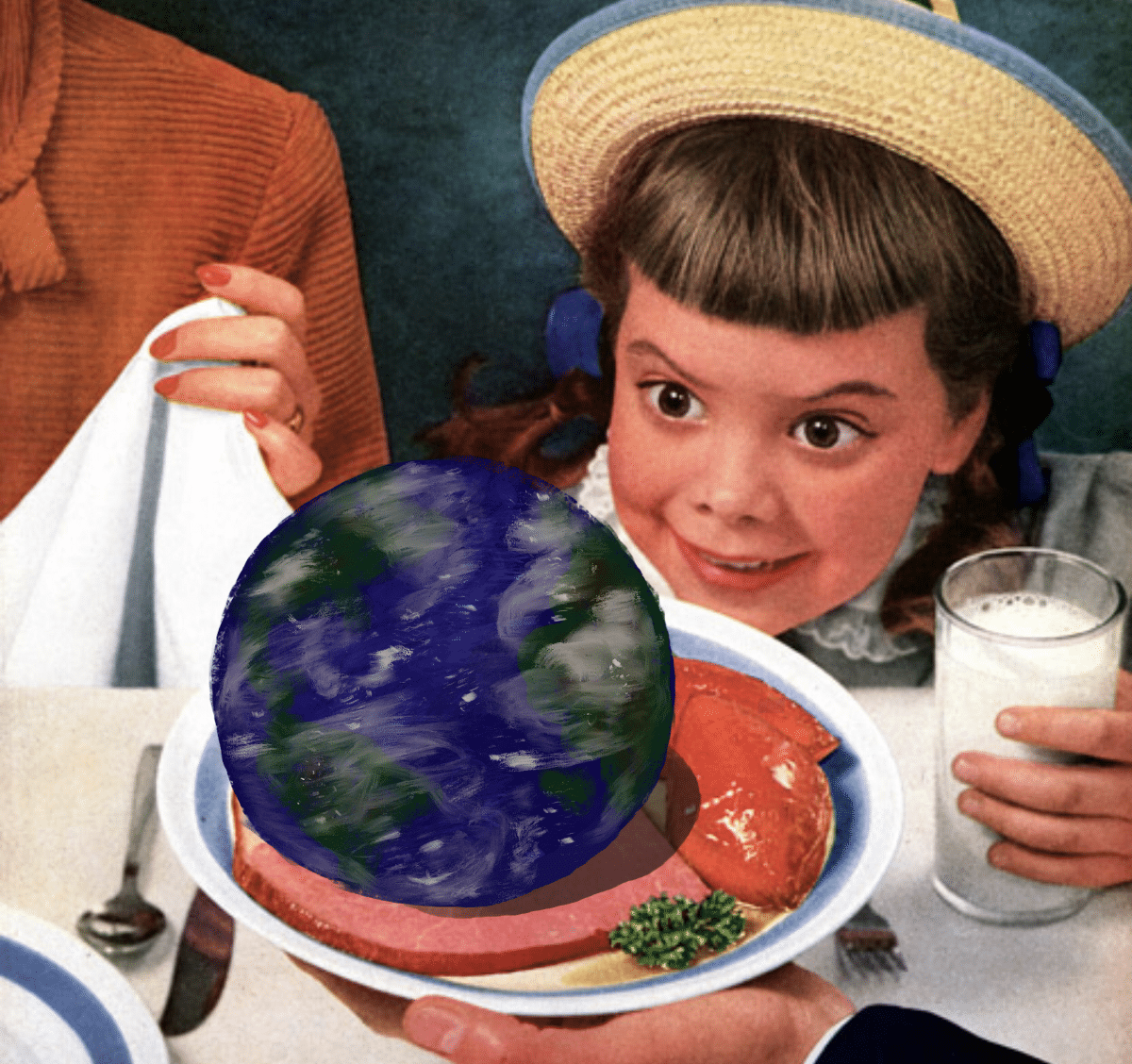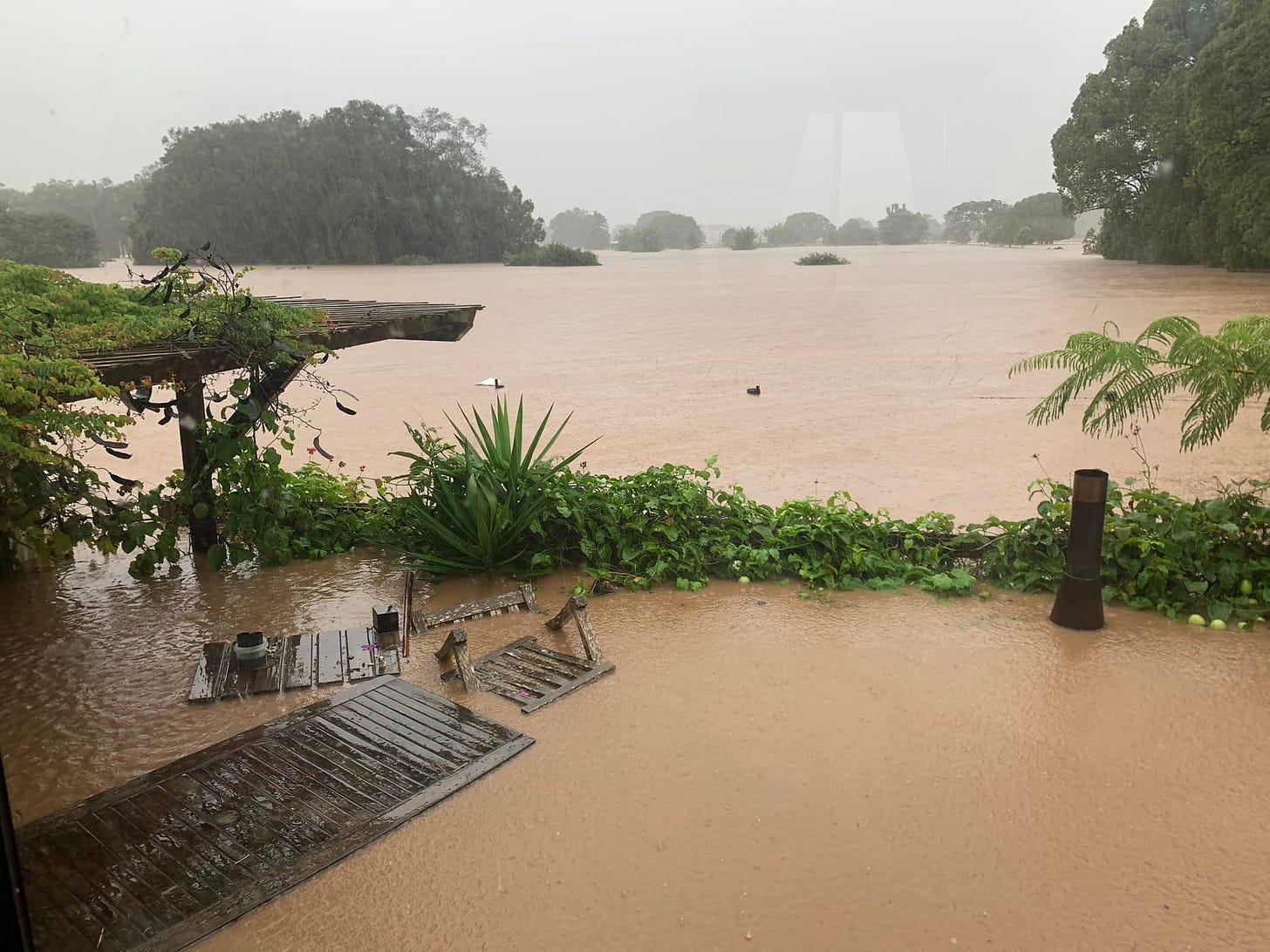In praise of slow, simple, humble.
I see you earthworms.
Michael Meade says slow and down are movements of the soul. Slow and down, are also movements of the soil.
Art: Clifford POSSUM TJAPALTJARRI - Worm Dreaming, 1994
The humble and splendid earthworm plows its way through meter deep earth aerating and improving soil structure. Thanks to earthworms, plants and fungi thrive in receiving the vital water, air and nutrition they need.
Earthworms, you could hardly say are dazzling or cute, they’re viscous things, not particularly alluring, but gee, how notable they are. Their conscientious work plays a keystone role in maintaining ecological balance and diversity. Like bees, we’d be more than a little bit lost without them.
How little thought though, is spared to honour their tireless efforts. When did you last revere an earthworm? Have you recently (or ever) raised your glass, sipped your tea, made a sweet potato gold offering to the divine squirmer? Let’s us here and together, revere them.
Image: Soil Association
Dear Earthworms, though your home amongst the soil is the most neglected of major ecosystems, you are not, we see you. Your work is humble and divine. Thank you.
It’s not lost on me the parallel of attentive earthworms and women caring. I’ve written previously on women holding things, inspired by Maira Kalman who said,
Sometimes when I’m feeling particularly happy or content I think I can provide sustenance for legions of human beings. I can hold the entire world in my arms. Other times I can barely cross the room. And I drop my arms frozen. There is never an end to holding and certainly there is often the feeling of never doing enough.
I’m not sure earthworms ever feel like they’re never doing enough.
Like women caring, earthworms impact so many things in our lives we may never have thought to consider. How many women have penned shopping lists, birthday lists, reminders, ‘gone to the shops’ and love notes.
Paper. Tree. Seedling. Roots, and amongst them, fine-haired engineers carrying out enduring, fertilising work. The tree grows, healthy, strong and straight; it gets felled, transported, processed and packaged and finally, it sits, neatly on a shelf for you to purchase. Thank you worms for your part to play in paper so we may write and draw and make.
Art: Machaca Corp, Eat the World, Analogue and digital art
Poets choose words, rather precise words, and place them together on paper. A line from Gail McConnell’s poem simply titled ‘Worm’, reads,
Eating the world, you open it.
What a marvel of an entrée. A famished sentence. In six small words I hear a voracious hunger for life’s multiplicity. I read desire and anticipation, and I feel them alive in me like a kid with a Christmas stocking… my brain serves me a side dish, Oliver Twist’s earnest, “Please Sir, can I have some more?”
Art: Regina Lankenau
Eating the world, sounds like thoughts from the mind of a whimsy child.
So too, you open it. What’s inside? Some coal. A can of worms? The writhing head of Medusa, another world to peer or fall into … I imagine pint-sized, plump hands - holding squirmy-stringy things - faces full and oscillating between glee and disgust.
Eating the world, you open it.
I chew on eating the world like follied gum whilst floating in a kind of existential zero gravity.
I eat the plant, the plant is me. Do I eat myself?
Face plant. I eat the earth.
Let’s not, that rabbit hole, let’s move on to Rebecca Elson’s main course, her Antidotes to Fear of Death poem begins
Sometimes as an antidote
To fear of death,
I eat the stars.
Those nights, lying on my back,
I suck them from the quenching dark
Til they are all, all inside me,
Pepper hot and sharp…
Image: NASA / ESA / Hubble / J. Lee / PHANGS-HST Team.
Sometimes I feel pepper hot and sharp, especially - speaking of caring - if I fold up my no and give away too many time-bites.
I eat the stars. I mean, exhale…… don’t these words fill you up?
Leave room for dessert - Bayo Akomolafe wrote an essay titled “When Grief Comes, Give it Something to Eat”. It’s curious, I have, when hard times moved in, often imagined my child self sitting on a school bench sharing a sandwich. A visual metaphor as a way of tending to myself. Jung says something along the lines that we must separate from what grieves in order to heal. My side by side sandwich sharing sometimes helps.
If feeding people is a love language, then maybe feeding grief is like setting an extra place at the table to welcome more love in.
Three delicious courses here: McConnell, Elson and Akomolafe. Fancy a petit-four from Aristotle? “Earthworms are the intestines of the soil” said he. Earthworms, intestines, same same’ish. Crucial. Human beings may survive without a large intestine, the small one however is essential.
After this poetic meal, I extend a digestive. Laméris offers more than scraps in this exquisite life and worm honouring poem. She is more like cognac than apple peels, both could be argued to have equal value.
Feeding the Worms
Danusha Laméris
Ever since I found out that earth worms have taste buds
all over the delicate pink strings of their bodies,
I pause dropping apple peels into the compost bin, imagine
the dark, writhing ecstasy, the sweetness of apples
permeating their pores. I offer beets and parsley,
avocado, and melon, the feathery tops of carrots.
I’d always thought theirs a menial life, eyeless and hidden,
almost vulgar—though now, it seems, they bear a pleasure
so sublime, so decadent, I want to contribute however I can,
forgetting, a moment, my place on the menu.
I adore the interwoven life-death-life-death-life-death nature of this poem. So often death is over there, in abeyance, at the end, as if our trajectory sounds like life, life, life, life.. life… life…. life \ death.
Life and death are inextricably linked, so too grief and love - each appears where the other resides. This revelatory poem invites us to reimagine our relationship with the tiny, slimy, dwellers of the dark and remember our place in the kingdom of wild things.
We overlook acknowledgement and support for women caring yet so often we express admiration for our strong spine and steely fortitude. We stand by our sceptres of knowing, are held together by swathes of fine ‘things’, we are adored by followers and fans, yet researchers reflect back to us that we (yes the royal one) are so very, very lonely. Our roots are sick.
But to waiver continues to be interpreted as weakness, to bend or break in dominant western culture, is to flail and fail. Earthworms on the other hand have no backbone, no skeleton holding them steady, yet the power they exude is exemplary. It makes me think, maybe our real strength is less in our bones and more in our marrow.
What if we were more like unpretentious earthworms than jungle kings? What if we were to slow down and work together to honour processes in the dark, to create spacious pockets for our fragile softness, vulnerability and yes, sometimes even blindness. What if we make more room for each other? What if we steadily and surely aerate the spaces we spend time, could community structures become stronger by putting our heads down and delivering vital nutrition, a breath of fresh air, watering collaborative seeds?
Connection. Belonging. If we move soulfully back towards our roots, could they be made more possible? If worms in great numbers are a positive environmental indicator, why not people? If a thriving community is an abundant number of diverse people participating, this is an indicator of good health no? Instead of trying to reach mass audiences what if we read our local environment, move where we are - slow and down.
Earthworm tunnels protect soil from flash flooding. As our garden became a lake in the 2023 floods, I grieved my compost. “Big water,” I said, “take the bikes, take the outdoor furniture, but please leave my compost alone”. Little did I realise, those earthen creatures were methodically preserving my precious kitchen midden.
My compost is valuable. But humans do (and have) other things which hold a certain social value and acumen. We wear the threads, drive the car, choose the school, buy the things and too often claim ideas and work of others as our own - talk is talked in a way that is emphatically knowing and expert… and whilst songs of humility are sung, they can be a little bit too loud.
Hearing peers, colleagues, parents, partners, people we’ve never met admire and adore our efforts or standing affirms our sense of worth. We feel good, of value - there’s a sense of tribal belonging. But Earthworms, they belong, just because they do.
The Earthworm does not say to their kin, “Come, look at me, look at my good work. Let me tell you about Earwig whilst you marvel at my renovation!”
Never does Earthworm say to Fungi, “Look at what I have done for you, now praise me.” Nor would one hear, “Admire my spacious tunnel, appreciate me, affirm me, adore me, watch how I devour the decay and turn it into prized poo.”
Earthworm humbly continues. They simply put their sectional, muscular bodies to work, slowly and powerfully bringing about betterment for their plant and fungi friends.
On friends, what holds more value, long distance relationships or more proximal love?
We may experience connection, engagement, admiration from global social media followers, though how well do we know our friends, neighbours and community? Who lives on your street?
What if we offer love to each other like Laméris offers the worms beets, parsley and the feathery tops of carrots? What if we pull our heads in and get a little more authentically humble, breathe that in.
You know earthworms don’t have lungs, they have five to ten pairs of simple hearts called aortic arches. These many hearts help them breathe through their skin. How much love could be practiced if we had five pairs of hearts? What if we set another place at the table for more love? How much better might we all breathe in our skin if we were to practice loving with five pairs of hearts?
Final thought here on the page, there is a surplus of capitalist early birds catching too many worms. What if earthworms in their warping and wefting, offer a resting place for the sorrows of Earth whom we’ve plundered. May we care for, and revere our earthworm friends as much as we do fanciful things. Let us bank gold people. Make more compost, replenish the earthworm stocks. Insider tip: Invest in many hearts.
May we tuck earthworm energy in our heart pockets to remind us to be attentive and humble. May we move slow and down. May we care too deeply for each other. When it gets gritty, let us bind ourselves to each other and make more love. May we eat well and remember to cherish (and more fairly redistribute) the work of women caring. May we meet again, through words or water, earth, maybe the stuff of stars. May we keep returning and tending our roots, and in this, offer each other resting places to be soft so that we may again, be strong together.
With love, five pairs of hearts-full
Emma
Refs:
Sally Coulthard - Book of the Earthworm
Danish Laméris - Feeding the Worms,
New York Times - Can worms feel pain?
Bayo Akomolafe - When grief comes, give it something to eat.
Earthworm Nervous System
Wise up on Worms
The Guardian, George Monbiot, The Secret World Beneath Our Feet is Mind-Blowing and the Key to Our Planet’s Future
Human compost








